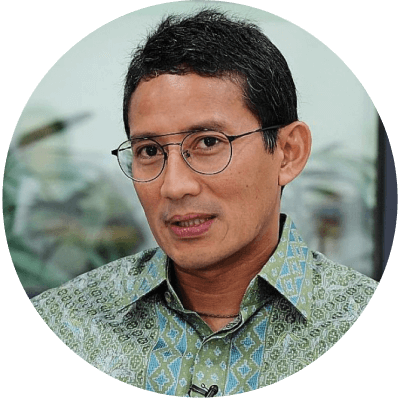Strands
Leadership Wisdom Series

Speaker Bio
Session
Q&A
SPEAKER BIO
Sandiaga Uno is one of Indonesia’s leading political and business icons. He currently serves as the Minister of Tourism and Creative Economy. He previously served as Vice Governor of Jakarta from October 2017 to August 2018.
He was also a candidate for the Vice Presidency of the Republic of Indonesia in the 2019 election. Sandiaga is the cofounder of PT Saratoga Investama, the first and biggest publicly listed active investment company in Indonesia for which he served as President Director from 2004 to 2015. He has led the investment firm to a solid track record of profitable investments across key sectors of the Indonesian economy. In 2016, Sandiaga received the title of ‘Distinguished Research Professor in Residence’ from George Washington University.
His Leadership Wisdom Series session focused on looking into the new world, post Covid- 19. Sandiaga assessed the future of Indonesia through a post Covid-19 lens and explained the impact of the pandemic on different sectors of the Indonesian economy.
Looking into the New World
Sandiaga provided a brief history and background of the impact of Covid-19 on Indonesia. He depicted that approximately 81% of the 3.3 billion global work-force were affected by workplace closure, with a 6.7% reduction of work hours at the global level in Q2 of 2020. In Indonesia alone, 1.2 million workers from 74,000 companies were laid off.
He suggested that approximately there was likely be a shift in the global geopolitical order. Countries have learnt the hard way due to Covid, that there is global interdependence. He believes that this type of crisis brought the best out of humanity, but also the worst out of leadership. We must ensure that we are not exposed to this type of risk going forward. We need to have systems built to prepare for future pandemics which means rearranging some supplies of basic necessities and localising a lot of these, such as food, water, energy and pharmaceuticals. Can we risk relying on others for the science and technology that will be needed if we face another pandemic? This will change the way people consume. Maybe this will take us beyond borders and return us to working via the most efficient eco systems for sustainability. Sandiaga believes it is the beginning of a very interesting journey.
The main priorities faced in Indonesia are:
- Flattening the pandemic curve
- The threat of unemployment
- Flattening the recession curve
Q&A
What is your advice for labour intensive industries such as the garment industry?
How can they recover from the impacts of Covid-19? We are facing the same issue here with labour intensive industries such as the garment industries – they need to pivot towards the creation of PPE and face masks. It has been very difficult but I believe this crisis will reinvent some of the innovations that specific industries have needed. We are forecasting that in 2021, many of these industries will have a sharp bounce back.
What is the economic forecast for Indonesia?
As much as I’d like to look at the numbers, I’m also listening to the anecdotal stories from citizens. One example is Miss Hikma, who owns a florist and had to lay off some employees. Not too far from Miss Hikma, I speak to Mr Budi who sells ginger milk. The price of ginger sky rocketed at the start of the pandemic, but he chose to keep prices the same and this made his sales double. Everyone’s situation is different. We are going to rebound quite strongly. If the government puts the right macro policies in place, we will do much better than people predict. We plan for the rebound, but we have to take it day by day and case by case.
What might be the impact on China’s ‘belt and brace’ initiative and drive on wider supply disruptions?
Great question – they will be rethinking the belt. In Indonesia, we noticed the price of garlic sky rocketing in the first few weeks of the pandemic as it was being imported from China, who had recently closed their borders. This reinforced the importance that the next supply of food needs to be more localised, urban and backyard farming will need to take shape. Carbon credit will be making a comeback. We need to put on our thinking caps and consider the architecture of our society post Covid-19.
What are the key challenges we will be facing globally and specifically for Indonesia in the wake of Covid-19?
No country has been prepared for this and unfortunately, global leadership is, at best, absent during this pandemic. There is a lot of shifting blame and miscommunication. Churchill’s handling of the Second World War is exemplary in that he put aside all ideological differences to ensure the success of Great Britain and its allies. We are now fighting a war against this disease so if Churchill was around, I’m sure he would advise all world leaders to sit down and discuss how to move forward in a cooperative manner on both a scientific and economic front. With the latter, he would advise how we could tailor our efforts globally to ensure that our economies are not destroyed post Covid-19. We have also witnessed the damage we’ve inflicted upon this planet – for the first time in years, we can see blue skies in Jakarta due to reduced emissions amongst other things. Climate change will also be a big priority for us in our post Covid-19 efforts.